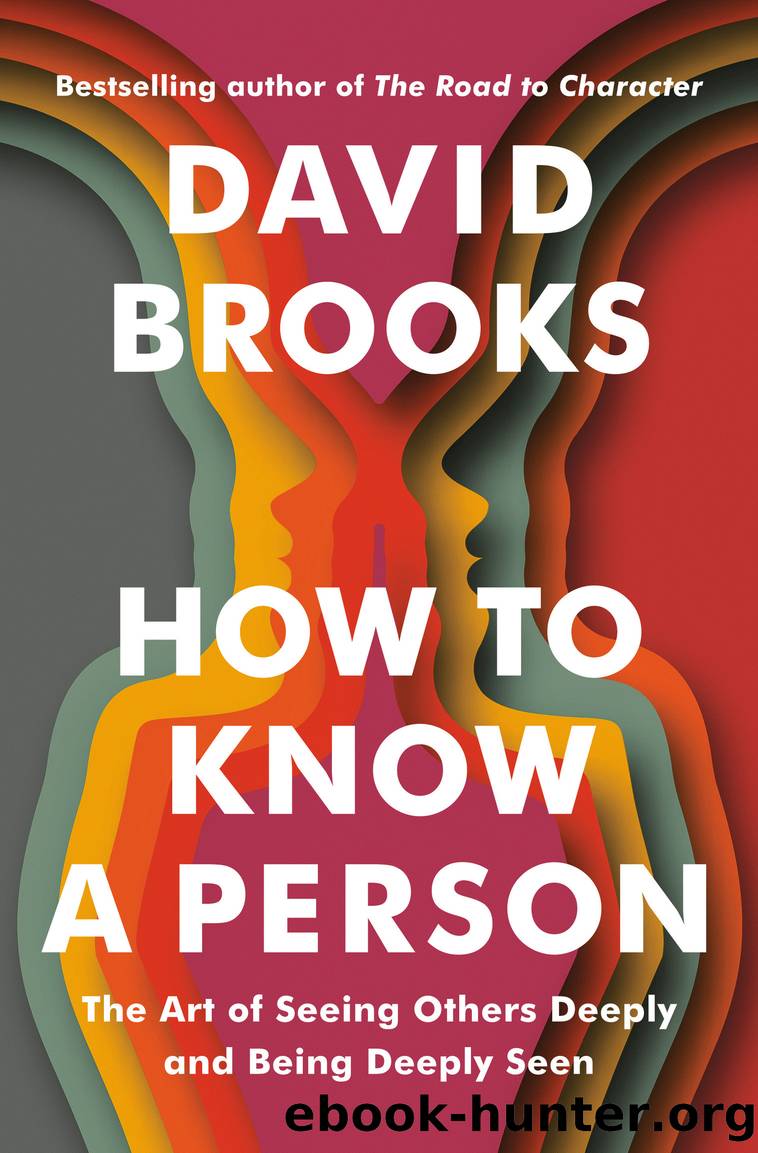How to Know a Person by David Brooks

Author:David Brooks [Brooks, David]
Language: eng
Format: epub
Publisher: Random House Publishing Group
Published: 2023-10-24T00:00:00+00:00
* * *
â
How does this process of excavation work? How do we help each other go back into the past and reinvent the story of our lives? There are certain exercises that friends can do together.
First, friends can ask each other the kinds of questions that help people see more deeply into their own childhoods. Psychologists recommend that you ask your friend to fill in the blanks to these two statements: âIn our family, the one thing you must never do is _____â and âIn our family, the one thing you must do above all else is ________.â Thatâs a way to help a person see more clearly the deep values that were embedded in the way they were raised.
Second, you can try âThis Is Your Life.â This is a game some couples play at the end of each year. They write out a summary of the year from their partnerâs point of view. That is, they write, in the first person, about what challenges their partner faced and how he or she overcame them. Reading over these first-person accounts of your life can be an exhilarating experience. You see yourself through the eyes of one who loves you. People who have been hurt need somebody they trust to narrate their life, stand up to their own self-contempt, and believe the best of them.
The third exercise is called âFilling in the Calendar.â This involves walking through periods of the other personâs life, year by year. What was your life like in second grade? In third grade?
The fourth is story sampling. For decades, James Pennebaker of the University of Texas at Austin has had people do free-form expressive-writing exercises. He says: Open your notebook. Set a timer for twenty minutes. Write about your emotional experiences. Donât worry about punctuation or sloppiness. Go wherever your mind takes you. Write just for yourself. Throw it out at the end. In the beginning, people who take part in expressive-writing exercises sometimes use different voices and even different handwriting styles. Their stories are raw and disjointed. But then unconscious thoughts surface. They try on different perspectives. Their narratives grow more coherent and self-aware as the days go by. They turn from victims to writers. Some studies show that people who go through this process emerge with lower blood pressure and healthier immune systems. âI write,â Susan Sontag once remarked, âto define myselfâan act of self-creationâpart of the process of becoming.â
The fifth exercise is my favorite. Put aside all the self-conscious exercises and just have serious conversations with friends. If youâve lost someone dear to you, tell each other stories about that person. Reflect on the strange journey that is grief; tell new stories about what life will look like in the years ahead.
Download
This site does not store any files on its server. We only index and link to content provided by other sites. Please contact the content providers to delete copyright contents if any and email us, we'll remove relevant links or contents immediately.
| Codependency | Conflict Management |
| Dating | Divorce |
| Friendship | Interpersonal Relations |
| Love & Loss | Love & Romance |
| Marriage | Mate Seeking |
The 5 Love Languages: The Secret to Love That Lasts by Gary Chapman(9172)
Doing It: Let's Talk About Sex... by Hannah Witton(9054)
Should I Stay or Should I Go? by Ramani Durvasula(7384)
The Road Less Traveled by M. Scott Peck(7232)
The Lost Art of Listening by Michael P. Nichols(7105)
Daring Greatly by Brene Brown(6190)
We Need to Talk by Celeste Headlee(5380)
Beartown by Fredrik Backman(5293)
Men In Love by Nancy Friday(4931)
The Rules Do Not Apply by Ariel Levy(4485)
The State of Affairs by Esther Perel(4446)
How To Win Friends and Influence People by Dale Carnegie(4289)
Reflections Of A Man by Mr. Amari Soul(4098)
The Ethical Slut by Janet W. Hardy(4008)
Pillow Thoughts by Courtney Peppernell(3973)
Algedonic by r.h. Sin(3860)
He's Just Not That Into You by Greg Behrendt & Liz Tuccillo(3686)
I Love You But I Don't Trust You by Mira Kirshenbaum(3671)
Finding My Forever by Heidi McLaughlin(3650)
